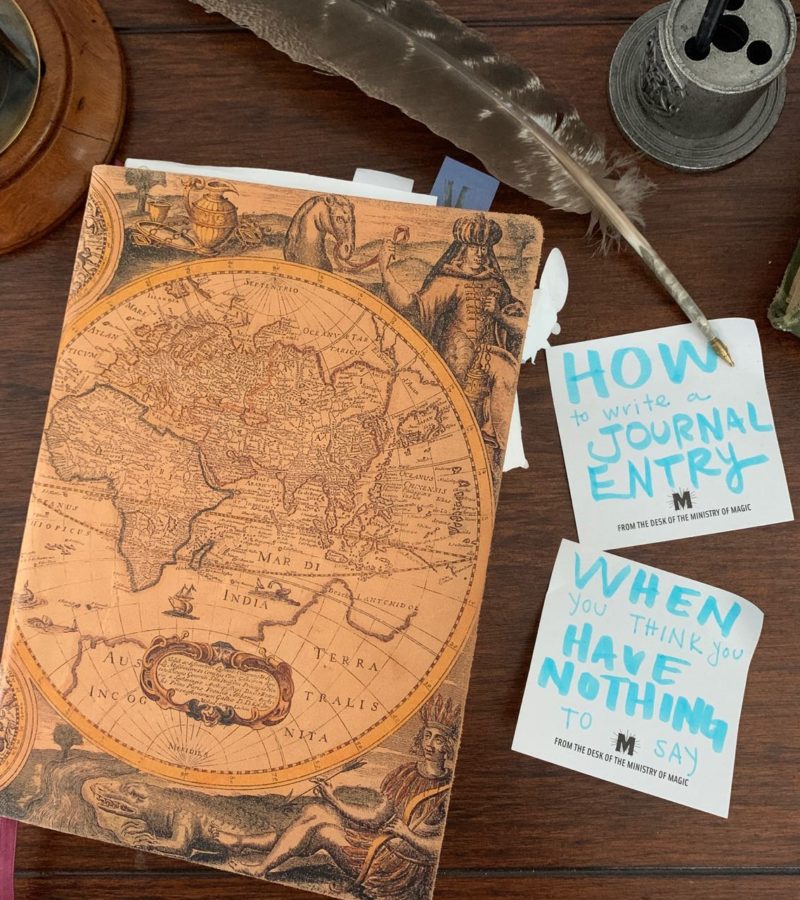I have kept a journal all my life. My first journal entry was actually written by my mom under my direction because I was too young to write. When I was a teenager, I got some advice on how to write a journal entry that I have followed ever since and I wanted to share it with you. I’ll show you how to make anything into an interesting journal entry. This method will also help you process your stress and emotions. Anyone else having a lot of stress and emotions right now?? Journaling has been a big help to me during these stressful times and I hope this helps you, too.
5 Things all Journal Entries Should Have
All journal entries should include:
- Who
- What
- Where
- When
- Why
- How
This is something you might have heard in writing. I had heard it, too. But I had never thought about how to apply it to journal writing. I’ll show you a sample journal entry and how each of these items can make it better.
What and When
Most people when they write a journal entry only include the what and when. For example:
March 24, 2020
I did the dishes today.
And then you make another entry in 10 years, right? Haha. I don’t blame you. So here’s where the other questions come in to help your journal entry.
Why
When you record what happened in the day, ask yourself why. WHY did you do that? For example:
March 24, 2020
I did the dishes today because my family has been home for a week now. We are self-isolating because of the corona virus.
Adding why you do things to your journal entry will give it context. Context is easily lost in old journal entries. People often assume they will remember why it was significant that they did the dishes on that day. I can promise you, as someone who regularly reads old journal entries, that it is not obvious. Writing down why you do things will give meaning to your entries when you go back and read them. It will also help you process what you are going through right now. Maybe you didn’t realize how much of an adjustment that was for you to do the dishes until you wrote it down and thought about it. It can help you give yourself much needed validation and compassion.
How
How did that make you feel?
March 24, 2020
I did the dishes today because my family has been home for a week now. We are self-isolating because of the corona virus. I felt overwhelmed by the amount of dishes there were to do. I miss our old life where we were able to eat out more often and I got a break from doing the dishes.
Writing how even seemingly unimportant things makes me feel has helped me process my emotions. By writing them down, I haven’t smothered or ignored them. Those feelings now feel taken care of and I can move on. Sometimes I’m afraid that if I ignore these Important Feelings, then I will regret it. Since I wrote them down, I can tell myself that if I ever need those Important Feelings, I can come back to them any time I need to. Most of the time, I don’t need those feelings again.
Where
Make it a habit to include place names in your entry. I do this more often when I travel, but if you are at home try to mention once in your journal what city, state, or country you live in. If you go to a restaurant, store, or other location write that down. Small details like this are really hard to find or remember when you go back and read your entries.
Who
Try to always include the first and last names of people you mention at least once per journal entry. After that, you can just use first names. Don’t assume 5 years from now you will know who “Tom” is that kindly left you paper plates. Also try to include quotes from people as much as you can. Even when I was only 7 years old, I would write direct quotes from my aunts, uncles, parents, cousins, and siblings. They are some of my favorite journal entries to read. I can’t tell you how much comfort it’s given me to go back and read quotes from family members who have passed away. Or read things my children said when they were little. By the way, include children’s ages when writing about them. It can be hard to figure out later and it also adds context to entries.
March 24, 2020
Los Angeles, California
I did the dishes today because my family has been home for a week now. We are self-isolating because of the corona virus. I felt overwhelmed by the amount of dishes there were to do. I miss our old life where we were able to eat out more often and I got a break from doing the dishes. When our neighbor, Tom Hanks, dropped off some extra paper plates today, I almost cried. I haven’t been able to find paper plates anywhere. I finally caught up with my dishes today because of those paper plates. When I told him how grateful I was through tears, he said, “Don’t cry! There’s no crying in baseball!!” It made me laugh. Tom is always saying things like that.
Here’s a little cheat sheet to remind you of all the items to put in a journal entry:
- When – Use full dates
- What – describe events and actions
- Why did you do that? Why did that happen?
- How did that make you feel?
- Where did this happen? Use cities, states, countries, and even location names like restaurants if you can.
- Who. When mentioning people, always use first and last names once per entry. If writing about kids, try to include their age too.
Journal writing can be powerful in overcoming trauma. Here’s a quote from an article in the New York Times from 2018:
On the other hand, Dr. Pennebaker’s research has found that journaling about traumatic or disturbing experiences specifically has the most measurable impact on our overall well-being.
In his landmark 1988 study, outlined in his book “Opening Up: The Healing Power of Expressing Emotion,” students were randomly assigned to write about either traumatic experiences or superficial topics for four days in a row. Six weeks after the writing sessions, those that had delved into traumatic experiences reported more positive moods and fewer illnesses than those writing about everyday experiences.
I hope this little blog post helps you. I picked the example of doing the dishes to show that you can write a journal entry about anything. I hope that you realize that your life is worth writing about. Everyone has something worthwhile to say.








 My name is Jessica. I love to read Young Adult and classic literature. I’ve been a book blogger for six years and I haven’t gotten tired of it yet. I’m a very curious reader. Writing about all the questions and thoughts I had while reading a book is the best hobby ever.
My name is Jessica. I love to read Young Adult and classic literature. I’ve been a book blogger for six years and I haven’t gotten tired of it yet. I’m a very curious reader. Writing about all the questions and thoughts I had while reading a book is the best hobby ever.
Leave a Reply